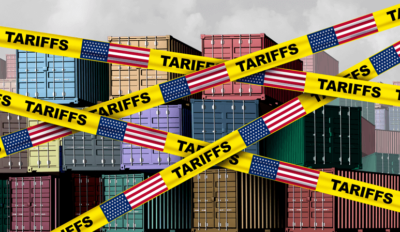Digital Finance Transformation: 4 Key Innovations

If you are in the business of selling cars or managing a successful dealership, you already know digital innovations have already fundamentally changed the way cars are bought and sold. Whether it’s enhancing customer buying experiences, streamlining workflows or driving profitability – the future of car sales is here, and it’s digital.
Beyond digital retailing, driving much of the evolution is digital finance transformation. Digital transformation in finance is revolutionizing the way you connect with customers, transact, and manage the financial aspects of your dealership. It is also fundamentally changing consumer behavior and expectations.
You know that adapting to change is part of your DNA, but what does digital finance transformation really mean for your dealership? How can it transform not just how you do business but also the way your customers engage with you? And most importantly, how can you leverage the future of digital finance innovations to ultimately contribute to your dealership’s financial success.
In this blog, we’re going to talk about digital finance transformation. Yeah, it sounds a bit intimidating, but it’s super important and, honestly, pretty exciting. And you don’t need to be tech-savvy to get it. We’re talking about disruptors like AI powered finance decision engines, blockchain and smart contracts, chatbots and AI Assistants and all sorts of emerging digital finance innovations that make buying and selling a car easier and faster for you and your customers.

In this article
- 1 Transforming The Transaction: The Emergence of Digital Finance Innovations
- 2 4 Innovations of Digital Finance Transformation Impacting Automotive Finance:
- 2.1 Blockchain for Secure Transactions
- 2.2 2. AI-powered Decision Engines for Faster Financing
- 2.3 3. Chatbots for Interactive Customer Service
- 2.3.1 24/7 Availability
- 2.3.2 Instant Responses
- 2.3.3 AI-powered assistants deliver instant responses to customer inquiries. reducing wait times and creating a seamless user experience. Quick responses can also prevent customers from abandoning the online buying process.
- 2.3.4 Language Understanding and Contextual Conversations
- 2.3.5 Personalized Interactions
- 2.3.6 Lead Generation and Qualification
- 2.3.7 Inventory and Model Information
- 2.3.8 Appointment Scheduling
- 2.3.9 Finance Information
- 2.3.10 Post-Purchase Support
- 2.3.11 Data Analysis for Continuous Improvement
- 2.4 4. AI-powered Data Analytic Tools for Market Insights
- 2.4.1 Customer Segmentation and Targeting
- 2.4.2 Vehicle Preferences
- 2.4.3 Feature and Option Preferences
- 2.4.4 Communication Channels
- 2.4.5 Financing Preferences
- 2.4.6 Preferred Purchase Timing
- 2.4.7 Engagement with Content Types
- 2.4.8 Competitor Analysis
- 2.4.9 Customer Retention
- 2.4.10 Lead Prioritization
- 2.4.11 Inventory Management
- 2.4.12 Customer Acquisition
- 2.4.13 Service
- 2.5 Stepping Into the Future of Digital Finance in Auto Sales
Transforming The Transaction: The Emergence of Digital Finance Innovations
Automotive digital retailing is ushering in a new era, fundamentally changing the traditional dealership model, especially in the finance sector. This shift isn’t just about refining the process of buying a car; it’s about a complete reinvention that resonates with the contemporary, digitally-driven consumer.
Gone are the days of the conventional, often cumbersome dealership experience. In its place, a more streamlined, transparent, and customer-focused approach is emerging. This evolution is powered by cutting-edge digital finance tools and technologies that are redefining interactions between dealerships and customers, particularly in financial dealings.
Looking ahead into the future of digital finance, enhancing customer experiences remains a non-negotiable priority. Dealerships that embrace digital transformation in finance, with transparent negotiations, swift financing options, and straightforward processes, foster trust and stand out in this competitive market.
This customer-centric approach not only elevates satisfaction levels but also solidifies loyalty and drives profitability for forward-thinking automotive businesses embracing the evolving landscape of finance.
4 Innovations of Digital Finance Transformation Impacting Automotive Finance:
-
Blockchain for Secure Transactions

Think of blockchain, which is a part of more general digital finance transformation, like a special kind of digital notebook that everyone can see and use, but no one can erase or alter. But instead of one big page, this digital notebook is made up of lots of pages, called “blocks.”
Each transaction is recorded in a block. Each new page (block) is linked to the previous one, forming a chain. This way, every page in the notebook is connected, creating a chain of blocks – a blockchain! Once a block is added, changing the information within it is computationally impossible – and multiple security features keep the information protected and stable.
Dealerships can use blockchain to record transactions related to vehicle sales, financing, and service history. Each new transaction gets added to a new block, creating a secure and unchangeable record.
The decentralized nature of blockchain means the digital notebook and all its pages (blocks) are not kept in one place but shared across many computers. This decentralization means there’s no single authority in control; instead, everyone on the network has a copy of the notebook.
This transparency builds trust between parties and significantly reduces the risk of fraud or manipulation. Here are some specific benefits of blockchain technology for car dealers.
Smart Contracts for Streamlined Transactions
Smart contracts are self-executing contracts with the terms of the agreement directly written into code. Smart contracts can automate various processes such as vehicle sales, lease agreements, and warranty conditions. This digital finance transformation technology can streamline administrative tasks, reduce the need for third parties and accelerate transactions by reducing the excessive paperwork.
Data Security and Privacy
The decentralized nature of Blockchain provides a convenient and safe way to securely store and manage sensitive customer data, credit information, etc. Access to data is controlled through cryptographic keys, enhancing security and privacy – reducing the risk of data breaches and ensuring compliance with privacy regulations.
Traceability and Transparency
Blockchain allows tracking the complete history of a vehicle – from manufacturing to ownership to service histories – creating a digital identity for each vehicle. Dealerships can verify the authenticity of vehicle components and ensure that the vehicles in their inventory have a clear and documented history, offering a higher level of dealer-customer transparency.
This can be especially important for used cars. When selling a used vehicle, dealerships can provide buyers with a comprehensive and immutable history of the car. This can increase transparency, build trust, and potentially increase the resale value.
Innovative Financing Models
Blockchain is a part of digital finance transformation, and can facilitate decentralized marketplaces where buyers and sellers can transact directly without intermediaries – opening doors to new and innovative financing models, such as peer-to-peer lending. These alternative financing options can attract a broader range of customers.
Potentially, they can expand a dealership’s market reach and customer base. Decentralized marketplaces could reduce reliance on traditional intermediaries, potentially lowering transaction costs and increasing efficiency in the buying and selling process.
2. AI-powered Decision Engines for Faster Financing

To the surprise of nobody, multiple studies confirm the overwhelming majority of consumers dislike the overall length of time it takes to buy a car, especially the negotiation and finance aspects – highlighting an opportunity for digital finance transformation tools to provide transparency and reduce frictions around THE deal.
Emerging AI, rules-based finance decision engine technologies can support a limitless number of lenders, lender programs, credit tiers, incentives, lender pricing. Therefore, underwriting and advance guidelines – and quickly structuring all deal types.
Integrated with lender-proprietary credit scorecard models, these decision engines enable dealers to quote qualified rate and monthly payment options during the negotiation – and fundable deal structures matched to their lenders’ programs in seconds. This innovation offers several significant benefits for dealers.
Access to a Wide Range of Financing Options
With the ability to consider a limitless number of lenders and programs which came from digital finance transformation, dealers can offer a diverse range of full credit spectrum loan programs and highly personalized financing solutions. This flexibility allows you to meet the diverse needs and credit profiles of different customers
Speed & Transparency
With digital finance transformation, the negotiation becomes more straightforward when the dealer can quickly present real numbers and fundable options to the customer. This, therefore, reduces the time spent on back-and-forth discussions.
It also helps dealers hold gross during the negotiation and know what the finance participation is going to be. Transparency is a significant trust multiplier, reducing frictions that lead to higher closing ratios and fewer rehashes/defections.
Efficient Deal Structuring
The decision engine automates the process of matching the customer’s credit worthiness, and financial terms & conditions of the transaction with qualifying lender programs. This efficiency not only saves time but it increases approval rates and also reduces the likelihood of errors in the deal structuring process.
Increased PVR
Improving the speed and quality of the customers’ transition from Sales to F&I ultimately enhances product penetration and profitability.
Reduces the Time Spent in F&I
When the dealer can match the deal structure to a lender’s program during the negotiation, it leads to fewer deal unwinds and re-writes – and no lender decision to wait on. With digital finance transformation, the approval process is quicker because the lender’s criteria are already considered in the deal structure. This leads to a more streamlined process, where financing decisions can be made rapidly, often without the need for further negotiations or adjustments.
Faster Funding / Improved Cash Flow
The automated nature of the finance decision engine speeds up lender processing time and minimizes the risk of lender declines and counteroffers, positively impacting contracts in transit and cash flow.
Stronger Lender Relationships
The engine creates more time to handle more deliveries and foster stronger relationships with lenders. Consistently presenting well-qualified deals strengthens the dealer’s relationship with lenders, which can lead to better financing terms and more favorable conditions over time – creating collaborative and mutually beneficial partnerships.
Enhanced Customer Experience
Because everything is faster and smoother with digital finance transformation, customers are happier. The early realistic payment quoting, frictionless and transparent negotiation, quick approvals, and faster transitions to and through F&I are significant drivers of customer satisfaction and loyalty.
3. Chatbots for Interactive Customer Service

Chatbots and AI assistants can play a pivotal role in revolutionizing the online buying experience for customers, offering a range of benefits for car dealerships including increased engagement, higher browser-to-buyer conversions and overall satisfaction. Let’s explore how these finance digital transformation technologies can contribute to a more efficient, personalized, and user-friendly online customer journey.
24/7 Availability
In the age of digital finance transformation, your virtual dealership is never closed and the majority of shopping activities happen after hours. Chatbots provide round-the-clock service and support availability, allowing customers to interact with your dealership at their convenience.
The constant availability ensures that potential buyers can get information, schedule appointments, or ask questions. All that outside regular business hours, improves customer engagement.
Instant Responses
AI-powered assistants deliver instant responses to customer inquiries. reducing wait times and creating a seamless user experience. Quick responses can also prevent customers from abandoning the online buying process.
Language Understanding and Contextual Conversations
Advanced AI can understand natural language and engage in contextual conversations. This improves the user experience by allowing customers to communicate with the chatbot in a more conversational manner, similar to interacting with a human.
Personalized Interactions
AI Assistants can analyze customer data to offer personalized recommendations and responses. By tailoring interactions based on individual preferences and behavior, dealerships can create a more engaging and relevant online experience, moving the customer down funnel and increasing conversions
Lead Generation and Qualification
Chatbots can assist in generating and qualifying leads by collecting customer information and understanding their needs. In digital finance transformation, this helps dealerships identify potential buyers, gather relevant data, and prioritize leads for more targeted follow-up, improving the efficiency of the sales process.
Inventory and Model Information
Chatbots can provide information about available inventory, models, features, and pricing. Customers can easily access details about the vehicles they are interested in, facilitating informed decision-making. This feature contributes to a more transparent and customer-friendly online buying process.
Appointment Scheduling
AI assistants can assist in scheduling test drives, service appointments, or virtual consultations.Streamlining the appointment scheduling process makes it convenient for customers to plan their interactions with the dealership, increasing the likelihood of in-person visits and interactions.
Finance Information
Chatbots can guide customers through various stages of the buying process, providing information on financing options, incentives, and promotions.
This assistance helps customers navigate your finance platform, and complex decisions, making the online buying process more user-friendly and less intimidating.
Post-Purchase Support
AI assistants can provide post-purchase support, such as information about maintenance schedules, warranty details, or assistance with service appointments. Enhancing post-purchase support contributes to customer satisfaction and loyalty, fostering long-term relationships with the dealership.
Data Analysis for Continuous Improvement
AI can analyze customer interactions to gather insights for continuous improvement.
Dealerships can identify areas of improvement in the online buying process, refine responses, and enhance the overall customer journey based on data-driven feedback.
4. AI-powered Data Analytic Tools for Market Insights

In the future of digital finance innovations, AI-powered data analytic dealer tools can offer significant advantages to car dealers making data-driven business decisions and optimizing their operations. These tools can identify and predict various market trends and customer preferences based on interactions, behaviors and historical data.
By leveraging these innovations, dealers can enhance customer engagement, increase sales, and operate more competitively in the dynamic automotive industry. As an example, understanding customer preferences can create more targeted opportunities and personalized marketing campaigns. They not only enhance the effectiveness of your marketing efforts but also improve customer satisfaction by providing a more tailored and relevant experience.
Here are some examples of how these digital finance transformation tools and insights can assist car dealers:
Customer Segmentation and Targeting
AI analytics can analyze vast amounts of customer data to identify patterns and preferences. This enables dealerships to create precise customer segments based on demographics, behaviors, and purchase history.
With the help of this digital finance transformation tool, dealers can tailor marketing strategies and promotional campaigns to specific customer segments, optimizing their efforts and increasing the likelihood of reaching potential buyers.
Vehicle Preferences
Understanding which vehicle segments (e.g., sedans, SUVs, trucks) a customer prefers based on their browsing history and past purchases allows dealerships to personalize marketing efforts by showcasing relevant vehicle models, sending targeted promotions, and tailoring test drive opportunities based on customers’ preferred vehicle types.
Feature and Option Preferences
By identifying the features, options, and configurations that customers often show interest in or select during the vehicle customization process, dealerships can create targeted content emphasizing these preferred features in advertising, social media campaigns, and email promotions to capture the customer’s attention.
Communication Channels
Analyzing communication preferences, such as whether customers prefer contact via email, phone calls, text messages, or online chat, dealerships can tailor their communication strategies to match customers’ preferences, ensuring more effective and well-received interactions.
Financing Preferences
Examining how customers approach financing options, whether they prefer leasing, traditional financing, or other payment structures. Dealerships can structure financing deals based on individual preferences, offering options that align with customers’ financial goals and preferences.
Preferred Purchase Timing
Analyzing historical purchase behavior and patterns to identify the time of year, month, or specific events when customers are more likely to make a purchase. Dealerships can use this information to time their marketing campaigns, promotions, and inventory updates to coincide with periods when customers are more receptive to making a purchase to fall in step with digital finance transformation.
Engagement with Content Types
Digital finance transformation allows dealers to analyze how customers engage with different types of content (e.g., videos, blogs, interactive features, etc). This gives dealerships an opportunity to tailor content creation to match preferred formats, ensuring that marketing materials resonate with customers and encourage interaction.
Competitor Analysis
AI tools can continuously monitor and analyze competitors’ pricing strategies, inventory levels, and customer reviews. Dealerships can gain a competitive edge by staying informed about market trends, adjusting their pricing strategies accordingly, and offering unique value propositions based on insights from competitors.
Additionally, predictive finance digital transformation analytic tools can forecast market trends and customer behaviors, helping dealers make more informed decisions. Here are some examples of how these tools can help dealers future proof their business
Customer Retention
Identify potential buyers within your existing database, predicting when customers are most likely to be in the market for a new vehicle. Dealerships can use this information to proactively target potential buyers, improving customer engagement and increasing conversions.
Lead Prioritization
Analyze customer interaction data and predict which leads are most likely to convert. It helps dealerships focus efforts on high-value opportunities and prioritize leads for more effective follow-up and improved conversion rates.
Inventory Management
Predictive analytics of digital finance transformation can forecast demand for specific vehicle models based on historical data, market trends, and external factors. This helps dealerships optimize their inventory, ensuring you stock vehicles that align with local market demand, reducing carrying costs and improving inventory turns.
Customer Acquisition
Predict when a customer might be in the market for a new vehicle or service. It helps dealerships identify targeted sales and conquesting opportunities.
Service
AI powered tools can predict vehicle maintenance needs, demand forecasting, and customer preferences and optimize service offerings, forecast maintenance requirements, and tailor marketing efforts based on predictive insights.
Stepping Into the Future of Digital Finance in Auto Sales

Integrating digital finance transformation tools and innovations in your dealership can bring more clarity, speed, and customer-friendly services. This shift can help improve sales and foster stronger, long-lasting relationships with customers. In today’s age where customers expect convenience, speed, and transparency, accepting this change is crucial. The future of digital finance in car sales is already here, and those who embrace this transformation are likely to achieve success and growth.



